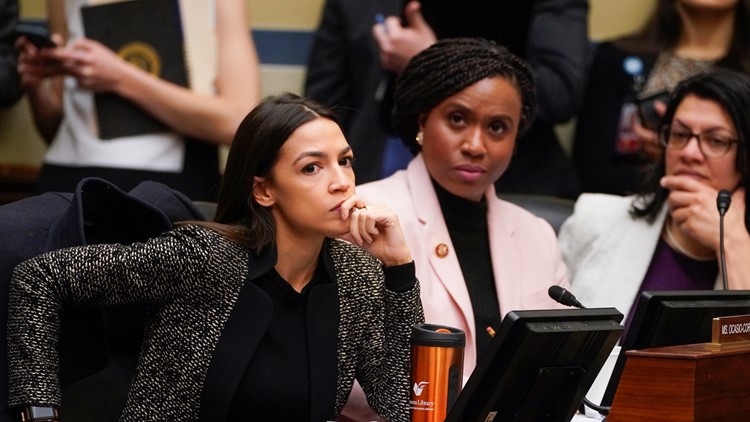A new Harris Poll finds that Generation Z and Millennials have "a more positive view of the word 'socialism' than previous generations."
The poll also claims the two younger generations are "more likely to embrace socialistic policies and principles than past generations," Axios reports.
Axios gives high-profile politicians like Sen. Bernie Sanders and Rep. Alexandria Ocasio-Cortez some of the credit for the modern draw to more "socialist" ideas.
What constitutes a "Millennial" and "Gen Z"
Pew Research Center uses 1996 as the "last birth year for Millennials," according to its website.
In other words, anyone born between 1981 and 1996 (23 to 38-years-old) is considered a Millennial, and anyone born in 1997 and afterward is considered to be apart of "Generation Z."
Changing perceptions: The young versus the older generations
Political experts say certain socialist ideas are becoming increasingly accepted as the perception of the word grows more positive among some people on the left side of the political spectrum.
"Socialism up until the last 15 years was equated with communism, especially by those people brought up in the Cold War," Barry Edwards, former trustee and financial director of the Democratic party of Florida, said. "The people who were around during that time have a negative connotation."
"People like Bernie Sanders are softer on it now, and younger Americans aren't necessarily negative about it," Edwards explained.
Older generations have long associated socialism with communism, words people like Karl Marx sometimes used interchangeably in the 19th century, according to Encyclopedia Britannica, which published an entire section on the nuanced differences that make communism a distinct ideology.
Susan MacManus, a retired political science professor at the University of South Florida, taught college students for 47 years and partially credits the shift with an incomplete understanding of the word itself.
"They don't know what the definition of socialism is - if you asked 20 people, 19 out of the 20 people would not be able to define it," MacManus said. "Older people are more familiar with what socialism means after living through the Cold War."
Encyclopedia Britannica defines socialism as a "social and economic doctrine that calls for public rather than private ownership or control of property and natural resources. According to the socialist view, individuals do not live or work in isolation but live in cooperation with one another. Furthermore, everything that people produce is in some sense a social product, and everyone who contributes to the production of a good is entitled to a share in it. Society as a whole, therefore, should own or at least control property for the benefit of all its members."
In MacManus' view, socialism isn't the only word that's been interpreted differently by different people.
"Along with socialism, there have been intertangled meaning of what equality and justice mean," MacManus said. "For years, different generations have used different labels of what these words mean and they're quite different."
MacManus says there's a lack of economic and economic history courses in both high school and college.
"Some students have no students have no idea where money comes from and have limited economic knowledge," MacManus added. "On the other hand, their understanding of sharing and collaborating are more formed."
The appeal
Socialism, along with its promises, seemingly carries a lot of appeal for younger, more liberal voters -- especially those who would like to see universal health care and tuition-free college.
"They're comfortable with it because you're talking about people who generally have a lot of personal debt and are generally staying at home longer, and tuition-free college, that's generally pretty appealing," Edwards said.
The Harris poll adds that the top voting issues for Gen Z are mass shootings, racial equality, and policy and treatment of immigrants. For Millennials, the top voting issues include access to health care, global warming or climate change, and mass shootings.
In fact, the poll found that 61 percent of Americans aged between 18 and 24 "have a positive reaction to the word 'socialism.'
The ongoing turmoil in Venezuela has also reinvigorated conversations about socialism. Conservatives and some people who have fled similar political unrest have pointed to the South American nation's current situation as an example of the shortcomings of democratic socialism. New York Times opinion columnist Bret Stephens recently dubbed Venezuela a "socialist catastrophe."
"We're seeing a shift in politics because of South America - In particular, Alexandria Ocasio-Cortez has performed seven percent better for bringing up socialism in Venezuela," Edwards said. "As politics goes, the cost of flow [information] in return is if you're Hispanic and from Venezuela, you're going to have a negative view of socialism."
Edwards says it's not just Republicans who have pushed back against attempts to institute too many socialist concepts in the United States -- many independents and moderates have pushed back too.
"Generally, America is a capitalist country," he explained. "If you're conservative or moderate, you're not going to want a socialist model, and are going to try to reinforce that socialism doesn't work."
The 2020 election: What's next?
MacManus sees the shift of perception and acceptance of socialism as a possible shift in the Democratic party.
"This is setting the framework for the 2020 elections, especially in the Democratic party, which is currently the most evident," MacManus said. "Younger Democrats are calling themselves 'progressives,' which pins them against old Democratic moderates, which seem to be generationally based. It begs the question -- what does it mean to be 'progressive.'"
The shift in the Democratic party could also be credited with a split in the party overall, MacManus adds.
"Democrats are currently the majority party in the House of Representatives, and the majority party is more likely to have a split," MacManus added. "There is currently a young versus old schism you see in society at large which pits younger progressives versus older Democrats in the presidential elections and candidates"
She added that the pendulum always swings in one direction or another with party splits. She mentioned a political cartoon that illustrates the body of a donkey cut in two, with Nancy Pelosi at the head. MacManus adds this proves the divide is noticeable and has gained national attention.
She says the Republican party saw a split with the 'Never Trumpers' and 'Trumpers' after the last presidential election.
This could have an impact on the electorate as well as the next presidential election, as Generation Z and Millennials start to file into the voting booth.
"Gen Z and Millennials are projected to make up 37% of the electorate in 2020, and what they're looking for in a presidential candidate is shifting," the Axios report included.
While MacManus agrees the younger generation has been demonstrated as more diverse, more liberal, and more racially and diverse than older generations, she also adds the poll and poll findings and reports may be overgeneralized.
"[The poll] paints a broad brush and is really unfair to [Millennials and Generation Z] who don't lean towards socialism," MacManus said. "It is obviously attention-grabbing to see the face of the Democratic party, which is now Cortez, is so different than older Democrats."
To go back to a broad painting brush, others are pushing against the notion of younger generations, namely Millennials, being drawn to socialism.
"Socialism is about shared misery, which is the opposite of what millennials want if their actions in the marketplace are to be taken seriously," John Tamny wrote in a 2018 column for Forbes, which argued that contrary to some research -- Millenials don't truly think socialism is "cool."
So, are Millenials really becoming more drawn to socialism, or is this just another study that misses the mark? Perhaps 2020 will reveal those answers.
What other people are reading right now:
►Make it easy to keep up-to-date with more stories like this. Download the 10News app now.
Have a news tip? Email desk@wtsp.com, or visit our Facebook page or Twitter feed.



